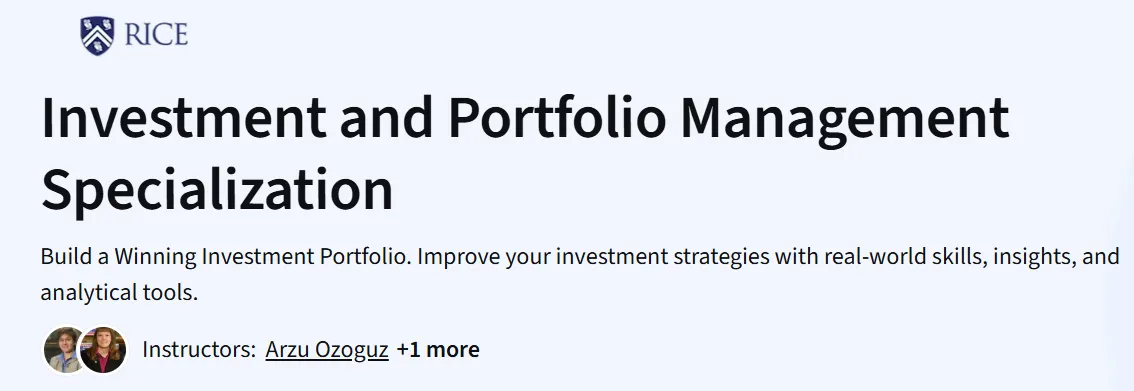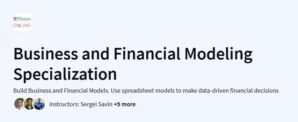What will you learn in Investment and Portfolio Management Specialization Course
Gain a strong foundation in global financial markets, instruments, and trading mechanisms.
Analyze stocks, bonds, derivatives, and alternative investments for portfolio decisions.
Master modern portfolio theory, risk-return tradeoffs, and asset allocation.
Learn behavioral finance and recognize investor biases in decision-making.
Apply strategies for portfolio construction, diversification, and performance evaluation.
Understand investment strategies such as passive vs. active investing and hedge fund approaches.
Program Overview
Global Financial Markets and Instruments
⏳ ~15 hours
Learn the structure and function of financial markets.
Study equity, debt, and derivative instruments.
Explore algorithmic trading, dark pools, margin trading, and short selling.
Understand valuation methods and institutional features of securities.
Portfolio Selection and Risk Management
⏳ ~20 hours
Apply modern portfolio theory and efficient frontier concepts.
Analyze diversification, risk-return tradeoffs, and optimal asset allocation.
Use quantitative tools to evaluate risk and performance.
Behavioral Investing
⏳ ~18 hours
Understand psychological biases and irrational investor behavior.
Study market anomalies and their effect on investments.
Apply behavioral finance concepts to improve portfolio decisions.
Investment Strategies and Portfolio Analysis
⏳ ~20 hours
Explore strategies like active vs. passive investing, hedge funds, and smart beta.
Conduct portfolio performance evaluations.
Learn to align investment goals with risk profiles.
Capstone Project
⏳ ~15–20 hours
Apply knowledge to create and test an investment portfolio.
Present analysis on allocation, risk, and expected performance.
Build a professional-grade portfolio strategy using real-world scenarios.
Get certificate
Job Outlook
Growing demand for investment managers, financial analysts, and wealth advisors.
Entry-level roles in investment banking and portfolio analysis range from $75K–$100K, with senior managers exceeding $150K+.
Employers seek professionals skilled in risk management, asset allocation, and portfolio optimization.
Hedge funds, banks, asset management firms, and fintech companies actively hire graduates with investment expertise.
Investment skills open doors to CFA, CFP, and MBA-level career advancement.
Specification: Investment and Portfolio Management Specialization
|
FAQs
- No advanced finance background is required.
- Basic math and interest in financial markets are helpful.
- Core concepts are explained from the ground up.
- Prior exposure to economics or business is an advantage, not a requirement.
- The course gradually builds from fundamentals to portfolio strategies.
- Includes real-world investment case studies.
- Uses portfolio simulations and market-based examples.
- Teaches how to evaluate stocks, bonds, and mutual funds.
- Explains risk-return trade-offs in actual market contexts.
- Focuses on applying strategies, not just definitions.
- It introduces key CFA Level 1 investment topics.
- Strengthens portfolio management and valuation knowledge.
- Not a substitute for full CFA prep programs.
- Acts as a solid foundation for certification pathways.
- Builds confidence in handling exam-style financial problems.
- Roles in investment banking, asset management, or equity research.
- Portfolio and wealth management positions in financial firms.
- Opportunities in financial consulting and advisory.
- Skills apply to fintech and startup investment roles.
- Enhances credibility for career growth in finance.
- Yes, the course is highly relevant for individual investors.
- Helps in building diversified portfolios.
- Teaches strategies for reducing investment risk.
- Improves decision-making in stock and bond markets.
- Guides on long-term wealth-building approaches.





